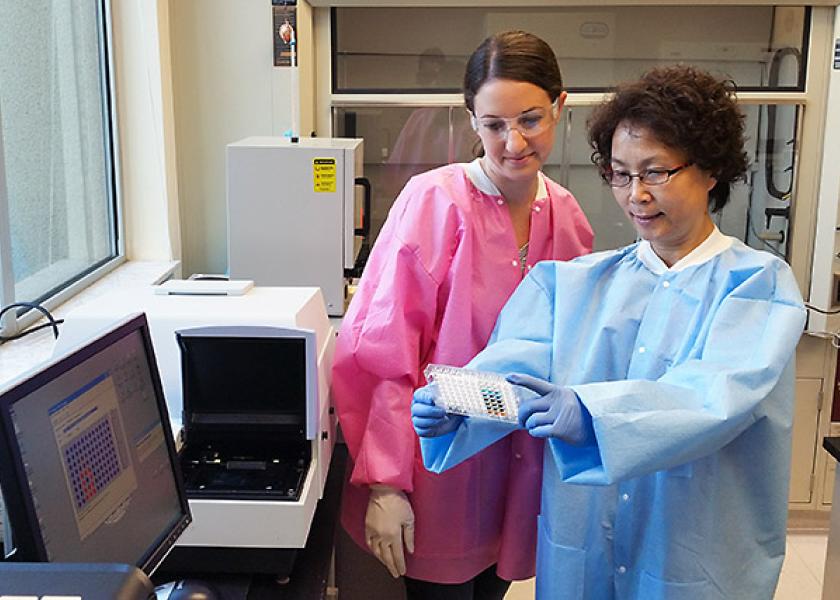Federal Investment in Ag Research is Essential for Competitiveness

A new effort to boost federal investment in agricultural research—FedByScience—was launched this week in Washington, DC, bringing together 16 public and private universities. The initiative, timed with the release of the 2018 House Farm Bill, focuses on demonstrating to the public and policymakers the many ways that USDA-funded universities and researchers are creating a safer, healthier and more productive food system.
“Access to safe, nutritious food and a healthy environment is a fundamental human right. The need for healthy food will only grow as we look to the future. There is no issue of greater importance for our experts in the agricultural and food sciences and few more deserving of federal support,” said Kathryn Boor, PhD, FedByScience co-chair and The Ronald P. Lynch Dean of Cornell University’s College of Agriculture and Life Sciences.
“US farmers are confronted by turbulent commodity markets, extreme weather and an uneven economy,” said FedByScience co-chair and University of Nebraska-Lincoln Chancellor Ronnie Green, PhD. “A stronger investment in agricultural research can provide the science and innovation that farmers need to navigate these obstacles. Universities are now joining together to ensure that our stories about the value of food and agricultural research are heard.”
FedByScience launched with two briefings for Senate and House of Representatives staff. The effort tells stories in which scientific discoveries and innovations have improved the way food is produced and distributed.
The agriculture and food production industries are facing considerable challenges today. For instance, Florida’s orange growers have been decimated by citrus greening disease, which has shrunk production every year for the past five years. A recent report from the National Academies concluded that, in the past 13 years, citrus greening has gone from a brand new disease to a chronic, long-term burden spread throughout Florida. As a result, Brazil has gained an increasingly larger share of the market while US farmers still have no answer for the bacteria that causes the disease.
Such challenges can only be addressed through additional research, yet the US agricultural research budget has declined in real dollars since 2003. The United States has been second to China in total public agricultural research funding since 2008; in 2013, China’s spending on public agricultural R&D became nearly double that of the United States.
“As researchers, we consider it our jobs to provide real world solutions,” said Lisa Schulte Moore of Iowa State University, whose water quality research in the Midwest is featured on the new initiative’s website. “But solid science and training the next generation of problem-solvers requires additional investment into our nation’s future.”
Dr. Schulte Moore and her colleagues, supported by USDA grants and other funding sources, examined a set of problems confronting corn and soybean farmers—soil and nutrient retention, especially during rainstorms—and engineered an improbable solution: interspersing strips of native prairie vegetation throughout the crop rows. Her team estimated that the prairie strips solution could be used on 9.6 million acres of cropland in Iowa and a large portion of the 170 million acres under similar management in the United States.
“There is so much that federally funded food and agriculture research has accomplished, but these stories need a broader audience,” said Thomas Grumbly, President of the SoAR Foundation, which organizes FedByScience. “We are delighted to collaborate with our university partners to make this initiative a reality.”
Participating universities include Colorado State University, Cornell University, Iowa State University, Kansas State University, Michigan State University, New Mexico State University, North Carolina State University, Purdue University, Texas A&M University, University of California at Davis, University of Florida, University of Georgia, University of Illinois at Urbana-Champaign, University of Nebraska-Lincoln, University of Wisconsin-Madison, and Washington University in St. Louis.
FedByScience is a collaborative initiative among universities to raise the visibility of the value of federal investment in food and agricultural research. FedByScience’s online collection of success stories highlights cutting-edge science that connects to the concerns of Americans.
About the Supporters of Agricultural Research (SoAR) Foundation
The SoAR Foundation leads a non-partisan coalition representing more than 6 million farming families, 100,000 scientists, hundreds of colleges and universities as well as consumers, veterinarians, and others. For more information, please visit www.supportagresearch.org.







